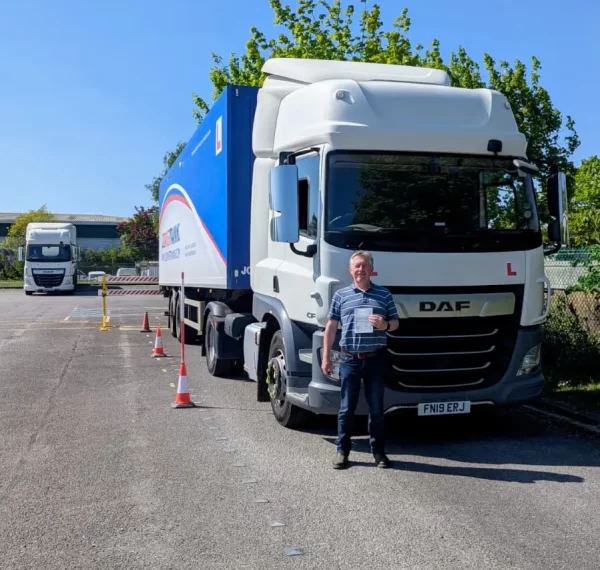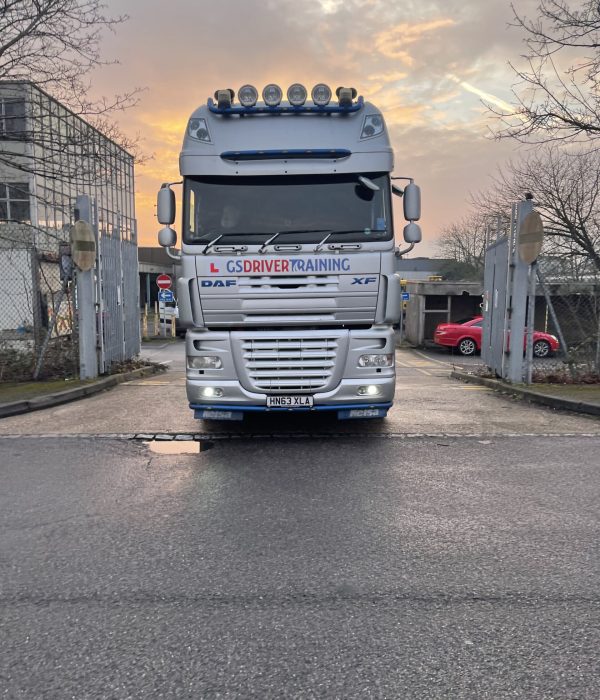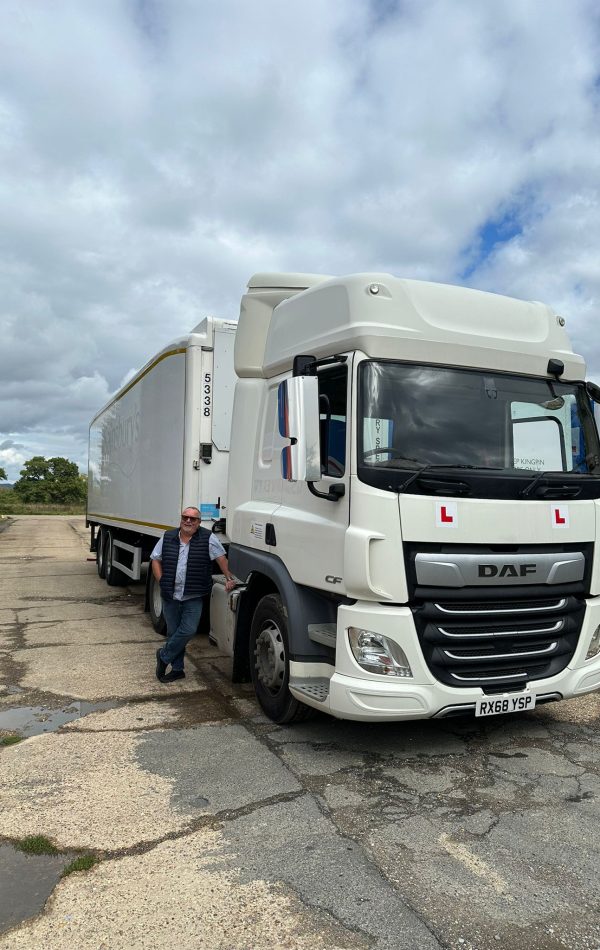HGV Training in Devon: Navigating the Road to Success
If you dream of a career behind the wheel of Heavy Goods Vehicles (HGVs) in the picturesque county of Devon, you’re on the right track.Here’s a guide to help you navigate the road to success in your HGV driver training journey.
Stay Informed About Industry Changes
Stay informed about changes in Devon’s CPC regulations by regularly checking relevant authorities’ updates and participating in industry events.
Understanding HGV Licences
Before you embark on your HGV driver training in Devon, it's crucial to understand the different licence categories. These include Category C1 for medium-sized lorries, Category C for larger lorries, and category C+E for articulated lorries. Each category requires specific training and testing.
Prerequisites and Eligibility
Ensure you meet the prerequisites for HGV driver training, including age requirements and health standards. Most Category C1 courses have a minimum age of 18, while Category C courses typically require you to be 21 or older.
Course Duration and Flexibility
The duration of can vary. Some providers offer intensive courses that last a few weeks, while others provide part-time options. Consider your schedule and choose a course that fits your timeline.
Network and Seek Advice
Connect with experienced HGV drivers in Devon or join online forums to gain insights and advice. Networking can provide valuable tips and a realistic view of the industry.
Prepare for the DVSA Tests
The Driver and Vehicle Standards Agency (DVSA) conducts tests to assess your theoretical and practical skills. Familiarise yourself with the DVSA's requirements and practice using official study materials.
Take Pride in Your Achievement
Completing HGV driver training in Devon is a significant achievement. Whether driving through the scenic landscapes of Dartmoor or navigating the roads of Exeter, take pride in being a qualified HGV driver.
Choosing the Right Training Provider
Devon offers various HGV driver training providers, but not all are created equal. Research and choose a reputable school with experienced instructors, positive reviews, and proper accreditation. Consider visiting the facility to get a feel for the training environment.
Job Opportunities and Market Demand
Devon's economy relies heavily on transportation, creating a demand for skilled HGV drivers. Explore job opportunities in logistics, delivery, and freight transport sectors to understand the potential career paths after completing your training.
Theory and Practical Components
HGV driver training combines essential theory with hands-on practical experience to prepare drivers for safe and effective heavy goods vehicle operation. Trainees learn about road safety, traffic laws, and vehicle maintenance, while also gaining real-world driving skills such as manoeuvring and handling various road conditions. This balanced approach ensures drivers are both knowledgeable and confident, supporting a safer and more efficient transport industry.
Comprehensive Guide to CPC Training in Devon: Navigating Professional Competence
If you aspire to be a proficient and compliant HGV driver in the picturesque county of Devon, undergoing CPC (Certificate of Professional Competence) training is crucial.This comprehensive guide will provide you with the information needed to navigate the CPC training process in Devon.
Frequency of CPC TrainingHGV drivers in Devon must undergo CPC training every five years to maintain their certification. This periodic training ensures drivers stay abreast of changes in regulations and industry best practices.

Understanding CPC Training
CPC training is a legal requirement for HGV drivers in Devon, aiming to enhance their professional skills and ensure compliance with industry standards. It covers many topics, including road safety, legal obligations, and efficient driving practices.
Enrolment Requirements
You typically need a valid HGV licence to enrol in CPC training in Devon. Some courses may have additional prerequisites, so confirm these with the chosen training provider.
Planning for Certificate Expiry
If your CPC training certificate is nearing expiration in Devon, plan and schedule periodic training in advance to maintain continuous compliance with legal requirements.
Accessibility of Online CPC Training
Several CPC training providers in Devon offer online courses, providing flexibility for drivers to complete the training at their own pace. Ensure that online courses meet necessary accreditation standards.

Selecting a Reputable Training Provider
Choose a CPC training provider in Devon wisely. Look for accredited courses, experienced instructors, and positive reviews. Visiting the training facility can give you insights into the quality of education offered.
Inclusivity for Drivers of All Experience Levels
CPC training is designed for both new and experienced HGV drivers in Devon. It ensures that drivers, regardless of experience, are well-informed about the latest industry standards and regulations.
Career Benefits of CPC Training
CPC training enhances your skills and knowledge, making you a safer and more efficient HGV driver. It opens doors to career advancement opportunities within the transport industry.
Topics Covered in CPC Training
The curriculum of CPC training encompasses road safety, vehicle maintenance, driver well-being, and legal aspects of HGV operation. This holistic approach aims to enhance the overall competence of drivers.
Staying Informed about CPC Regulations
Stay informed about changes in Devon's CPC regulations by regularly checking relevant authorities' updates and participating in industry events. This proactive approach ensures continuous awareness of training requirements and compliance standards modifications.
Mastering C1 Training in Devon: A Comprehensive Guide
If you aspire to drive medium-sized lorries in the scenic county of Devon, mastering C1 training is crucial to achieving your goal. This comprehensive guide provides valuable insights into navigating the C1 training process in Devon.
The C1 licence in Devon allows you to operate vehicles weighing between 3.5 and 7.5 tonnes. Before starting your C1 training, it’s essential to understand the specific category and its limitations.

Selecting a Reputable Training Provider: Research and choose a reputable C1 training provider in Devon. Ensure they offer accredited courses with experienced instructors and positive reviews. Visiting the training facility can help you assess its suitability.
Prerequisites for C1 Training: Enrolling in C1 training in Devon typically requires a valid Category B (car) driving licence. Confirm any additional prerequisites with your chosen training provider.
Course Structure and Duration: C1 training courses in Devon vary in structure and duration. Some providers offer intensive courses, while others provide part-time options. Choose a course that aligns with your schedule and learning preferences.
Theory and Practical Components: A comprehensive C1 training program includes both theoretical and practical components. Theoretical aspects cover road safety, vehicle operation, and emergency procedures. Practical training ensures you’re confident behind the wheel.
Vehicle Familiarisation As part of your C1 training in Devon, familiarise yourself with the vehicle you’ll be driving. Understanding the vehicle’s features and handling characteristics is crucial for safe and effective operation. Road Safety and Defensive DrivingEmphasize road safety and defensive driving: during your C1 training. Devon’s diverse road conditions require drivers to be vigilant and prepared for various situations.
Practice and Mock Tests: Use practice sessions and mock tests to assess your progress and readiness for the practical driving test. This hands-on experience enhances your confidence and performance.
DVSA Practical Test: The Driver and Vehicle Standards Agency (DVSA) conducts the practical driving test for the C1 licence in Devon. Prepare thoroughly for this test, which assesses your ability to handle the vehicle safely and competently.
Celebrate Your Achievement: Celebrate your achievement Upon completing your C1 training in Devon and passing the practical test. You’ve gained the skills and knowledge needed to operate medium-sized lorries confidently.
Navigating D1 Training in Devon: A Comprehensive Guide
Embarking on D1 training in the picturesque county of Devon signifies your desire to operate minibuses and vehicles carrying passengers. This comprehensive guide is designed to assist you in navigating the D1 training process in Devon.Understanding the D1 Licence
The D1 licence in Devon authorizes individuals to drive minibuses with a seating capacity of 9 to 16 passengers. Before commencing your D1 training, clearly understand the licence category and any accompanying restrictions.
Prerequisites for D1 Training
Enrolling in D1 training in Devon typically requires a valid Category B (car) driving licence. Additionally, age requirements may apply, so confirm these with your chosen training provider.
Course Structure and Duration
D1 training courses in Devon vary in structure and duration. Some providers offer intensive courses, while others provide part-time options. Select a course that aligns with your schedule and preferences.
Theoretical and Practical Training
A comprehensive D1 training program includes both theoretical and practical components. Theoretical aspects cover passenger safety, regulations, and vehicle operation, while practical training hones your driving skills.
Choosing a Reliable Training Provider
Research and select a reputable D1 training provider in Devon. Opt for providers with accredited courses, experienced instructors, and positive reviews. Visiting the training facility allows you to assess its suitability for learning needs.
Emphasis on Passenger Safety
Given the nature of D1 driving, emphasize passenger safety during your training. Learn and practice procedures for securing passengers and responding to emergencies.
Practice and Simulation
Engage in practical exercises and simulations to reinforce your learning. Practice sessions should include scenarios relevant to driving minibuses, enhancing your ability to handle various situations.
Familiarization with Minibuses
As part of your D1 training in Devon, familiarize yourself with the specific minibuses you'll be driving. Understanding the vehicle's features and handling characteristics is essential for safe and efficient operation.
DVSA Practical Test
The Driver and Vehicle Standards Agency (DVSA) administers the practical driving test for the D1 licence in Devon. Thorough preparation is vital to successfully demonstrating your competence in operating minibuses.
Celebrate Your Success
Upon completing your D1 training in Devon and passing the practical test, take a moment to celebrate your success. You've acquired the skills to drive minibuses responsibly, contributing to safe passenger transportation.
